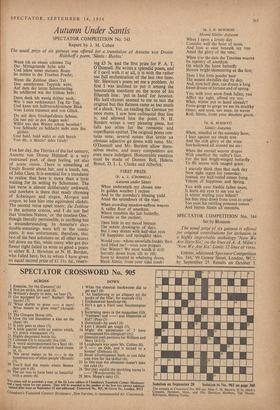Autumn Under Santis
The usual prize of six guineas was offered for a translation of Annette von Droste Hillshoffs poem, 'Santis : Herbts.'
Wenn ich an einem schonen Tag Der Mittagstunde habe acht Und lehne tamer meinem Baum So mitten in der Trauben Pracht;
Wenn die Zeitlose fibers Tal Den amethysnen Teppich webt, Auf dem der letzte Schmetterling So schillernd wie der frfihste bebt:
Denn denk ich wenig dither nach, Wie 's nun verktlmmert Tag far Tag, Und kann mit halbverschlosznem Blick Vom Lenze traumen and von Gltick.
Du mit dem frischgefallnen Schnee, Du tust mir in den Augen weh Willst uns den Winter schon bereiten?
Von Schlucht zu Schlucht sieht man ihn gleiten, Und bald, bald walzt er sich herab Von dir, o Santis! odes Grab!
FOR her day, the Thirties of the last century, Annette von Droste Halshoff is a very restrained poet, of deep feeling, yet also of acute vision. There is something of Emily Bronte about her, and a touch, too, of John Clare. It, is essential for a translator to realise that here is more than a lyric waiting for its setting by Schumann. The last verse is almost deliberately awkward, and nowhere is there that ready rhyming of Schwingen and singen, Morgen and sorgen, to lure him into equivalent clichés. The second verse upset many; die Zeitlose is the autumn crocus, and I do not feel that 'timeless Nature,' or 'the timeless One,' though literally permissible, is anything but a misunderstanding. In Annette's days double-meanings were left to the comic poets. It was unfortunate, therefore, that two of the best solutions on all other scores fell down on this, while many who got this flower right failed to write as good a poem as either R. J. Hewison or N. H. Burdett, who failed here, but to whom I have given an equal second prize of I Is. 6d., reserv- ing £3 3s. and the first prize for P. A. T. O'Donnell. He writes a splendid poem, and if I cavil with it at all, it is with the rather too full orchestration of the last two lines. Mr. Hewison's poem set me a problem. At first I was inclined to put it among the honourable mentions on the score of his fifteenth line: 'put in hand' for bereiten. His half-rhymes seemed to me to suit the original but this flatness came as too much of a shock. Yet, on reading the German yet once more, I saw how colloquial that line is, and allowed him the point. N. H. Burdett writes a very pleasing piece, but falls too often for the romantic and superfluous epithet. The original poem con- tains nine; several nouns that invite an obvious adjective go down with none. Mr. O'Donnell and Mr. Burdett allow them- selves twelve, and many competitors are even more indulgent. Honourable mention must be made of Doreen Bell, Helena Broun, D. L. L. Clarke and Alberick.
FIRST PRIZE (P. A. T. O'DONNELL) Autumn under Santis When underneath my chosen tree
In golden weather I recline And to the noonday's blessing yield Amid the splendours of the vine; When crowding meadow-saffron weaves A valley floor of amethyst, Where trembles the last butterfly, Ecstatic as the earliest;
Then little in my 'mood betrays The subtle drawing-in of days, But I may dream with half-shut eyes Of happiness and springlike skies.
Would you—whose snowfalls freshly flare And blind me I—even now prepare Our Winter? We must watch it drift Secretly down from rift to rift; Soon to descend in whelming doom, Bleak Santis, from your tidal tomb! (R. J. P. HEW1SON)
Mount Santis: A utumn When I upon a lovely day Consider well the hour of noon, And lean at ease beneath my tree Amid the glory of the vine;
When o'er the dale the Timeless weaves Its tapestry of amethyst On which the latest butterfly Hovers bright-shimmering as the first; Then I but little ponder how The season dwindles day by day, And, eyes half shut, can dream a long Sweet dream of fortune and of spring.
You, with your snow fresh fallen, you Afflict my' sight, offend my eye, What, winter put in hand already? From gorge to gorge we see its stealthy Onset; and soon, too soon, its waves Roll, Santis, from your desolate grave.
(N. H. BURDETT)
Siintis: Autumn
When, mindful of the noonday hour, I lean against my shady tree And the rich glory of the vines Sun-hallowed all around me see: When the eternal weaver drapes With amethyst the valley's face, For the last bright-winged butterfly To flit across with unaged grace: I scarcely think then that each day Now sighs regret for yesterday; Instead, my half-veiled senses bring Visions of happiness and Spring.
You with your freshly fallen snow, It hurts my eyes to see you so! Is winter waiting your behest? See him steal down from crest to crest! Too soon his swirling presence comes And barren Santis all entombs,


































 Previous page
Previous page